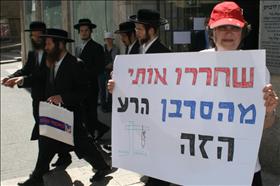Glass half full or empty?
The Rabbi Miri Gold Case Demystified
In this major achievment of Israel's move toward recognition of non-Orthodox rabbis, we must be careful to address challenges posed, and the road ahead.
07/06/2012 17:44
Tags: Miri Gold · Haaretz

A protest against the rabbinic courts at Jerusalem.19.03.2008. Photograph by: Elstar Miriam, Flash 90.
Last week marked an important chapter in religion and state relations in Israel when Israel’s Attorney General informed the Supreme Court of his consent to the Reform Movement’s demands regarding the appointment of 15 state funded rabbis, to serve as rabbis of non-Orthodox congregations across the country.
Celebrations erupted surrounding this historic decision, and, perhaps underscoring the importance of the event, furious reactions abounded from the Orthodox and ultra-Orthodox establishment. The truth, as usual, is more complex; it is possible to view the cup as half full or half empty.
Our cup is certainly half full. The petition by Rabbi Miri Gold, who has fought for this decision for seven years to be noted amongst the other 17 state-funded rabbis in her region, has largely been accepted. A crack has been formed in the fortified enclosure created by Orthodox politicians; this decision paves the way for equal public funding for the services of rabbis of all streams. This protective layer, which guards an Orthodox monopoly on Judaism, was established courtesy of both right and left-wing secular parties, eager to trade coalition votes for religious concessions.
The decision joins a long line of legal precedents defending the equality of different denominations: funding for liberal rabbinic seminaries, subsidies for the Reform conversion course and recognition of non-Orthodox conversions for the civil purposes. While the Orthodox monopoly was once considered unbreakable, Rabbi Miri Gold provides proof that this truism is indeed, untrue.
But the joy over this praiseworthy step must not blind us from seeing the cup half empty, and the problematical aspects of the Attorney General’s announcement. Predatory politics has turned religious life into a political commodity put up for sale, leaving only the courts to protect freedom of religion and equality.
As Rabbi Miri Gold and other rabbis like her serve a growing public, it shouldn’t have been necessary for the Israel Religious Action Center to submit legal petition in 2005 to establish this fact and its legitimacy. Since the filing of this petition, seven years have past, during which the State, with the approval of and possibly encouragement by the Attorney General, have engaged in every possible exercise to postpone the inevitable and refrain from the requested recognition. The Supreme Court aided these delays, and did not hurry to advance the just resolution.
The decision of the Attorney General did not come from “seeing the light”, rather a reaction of explicit comments by the justices which indicated the court was not prepared to stand by the government’s discriminatory policy.
The challenge therefore remains to continue laboring for an Israel that fully realizes its own founding promise for “religious freedom and equality”. We are now a step closer, but many more are still necessary to reach the destination.
The decision of the Attorney General is based more on political acrobatics than on value-based legal truth. The government avoided use of the title “Rabbi” or “Regional Rabbi” and instead uses the title “rabbi of a non-Orthodox community”. Budgets for these non-Orthodox rabbis will have to be renewed annually. Since Shas Minister for Religious Services Ya’akov Margi defiantly refused to fund these rabbis through his ministry, the authorities sidestepped this difficulty and instead will house these grants in the Ministry of Culture and Sports. And of course, as was to be expected, the Attorney General stressed they would have no impact on matters of Jewish law, e.g. legal officiation in marriage. There is still a long path to allowing egalitarian, progressive marriage, and no remedy at hand for the hundreds of thousands still denied the right of marriage altogether because the Orthodox establishment either does not consider them Jewish or eligible for marriage.
Additionally, these non-appointment-appointments were met with disturbing reactions by ultra-Orthodox political leaders. The head of coalition member party United Torah Judaism, MK Eichler, described it as “another proof that the legal system serve as soldiers in the Reform war against the Torah.” He went on to refer to the Reform movement as "Christians priests" who serve as partners to the heretical legal system, claiming the governmental system has been bribed by the Reform movement's apparently abundant wealth. Chair of the Knesset finance Committee Moshe Gafni responded saying “The legal system...now attempts to undermine the Jewish infrastructure of the State. All of a sudden, there is money for Reform and Conservative clowns for whom Judaism is a mockery.”
Religious Zionist leaders joined ultra-Orthodox ones in defaming the decision, maintaining that the Attorney General and the Supreme Court are leading an anti-Jewish campaign and delegitimizing their decisions. It leaves one wondering where moderate religious voices lie; surely not in the Knesset.
Once again we confront a reality unparalleled in the world, in which Israeli cabinet ministers and coalition partners compete with each other to express disrespect and disregard for the laws of the State, the values of equality and democracy, the upholding of civil liberties, and, of course, towards Jewish pluralism which is so central to Diaspora Jewry. Israel continues to seek Diaspora Jewry's financial and political support, but it does not hesitate to allow ministers and coalition members to insult and delegitimize them at will.
The challenge therefore remains to continue laboring for an Israel that fully realizes its own founding promise for “religious freedom and equality”, in meeting the clear desire of the overwhelming majority of Jews worldwide. We are now a step closer, but many more are still necessary to reach the destination.
See my post in Ha'artz.com